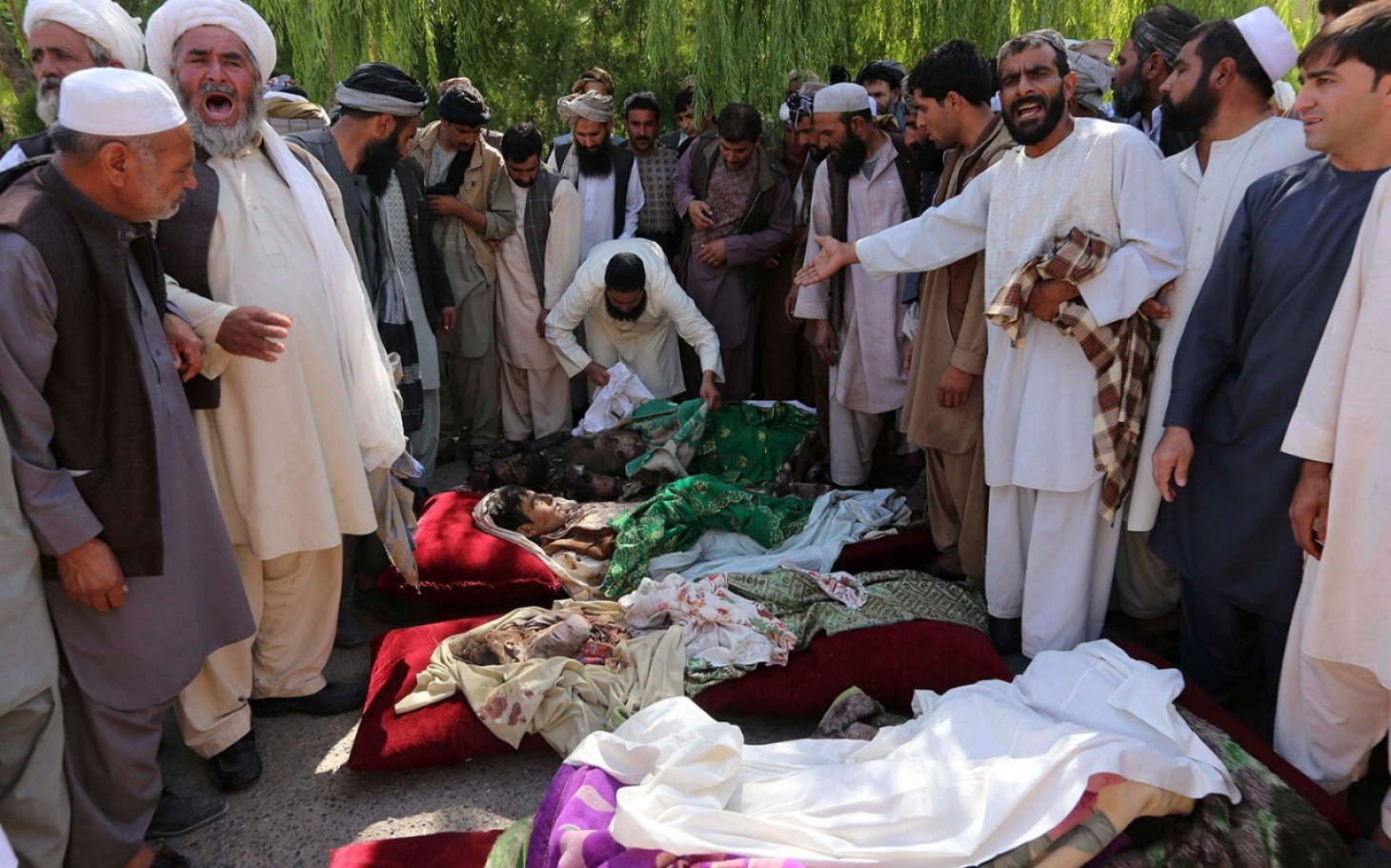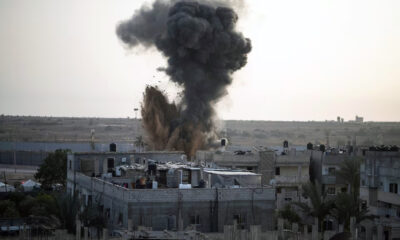Latest News
Sharp increase in civilian casualties this year: UNAMA Report

UNAMA has found that the number of civilians killed and injured in the first three months of 2021 was significantly higher than a year ago.
In its first quarter report on the Afghanistan Protection of Civilians in Armed Conflict 2021, UNAMA stated that 1,783 civilian casualties (573 killed and 1,210 injured) were recorded in the first three months of this year – a 29 percent increase against the same period last year.
UNAMA stated that extraordinary levels of harm inflicted on civilians in the Afghan conflict continues unabated and that “of particular concern is the 37 percent increase in the number of women killed and injured, and a 23 percent increase in child casualties compared with the first quarter of 2020”.
Deborah Lyons, the Secretary-General’s Special Representative for Afghanistan said: “The number of Afghan civilians killed and maimed, especially women and children, is deeply disturbing. I implore the parties to urgently find a way to stop this violence.”
UNAMA stated that the start of peace talks in September last year raised hopes for an improvement in the situation for civilians but in the six months between October 2020 and March 2021, UNAMA recorded a 38 percent increase in civilian casualties compared with the same period one year earlier.
“Every possible opportunity for peace must be seized. If levels of violence are not immediately reduced, thousands of Afghan civilians will continue to be killed and injured by fellow Afghans in 2021,” said Lyons, who is also head of UNAMA.
The overall increase in civilian casualties in the first quarter of 2021 was mainly driven by the same trends that caused the increase at the end of last year: ground engagements; improvised explosive devices; and targeted killings, UNAMA stated.
Anti-Government Elements continued to be responsible for the majority (61 percent) of all civilian casualties in the first three months of 2021, while Pro-Government Forces continued to cause approximately one quarter (27 percent) of the total civilian casualties.
In the first three months of 2021, UNAMA documented increases in the number of civilian casualties as compared to the first quarter of 2020, attributed to both the Afghan National Army, and the Taliban, with the Taliban responsible for 43.5 percent of all civilian casualties, and the Afghan National Army responsible for 17 percent.
UNAMA also stated it remains deeply concerned about the continued deliberate targeting of civilians by Anti-Government Elements, particularly through targeted killings – against civilians including media workers, civil society activists, members of the judiciary and the civilian government administration, including a particularly worrying trend of targeting of women.
“UNAMA reminds Anti-Government Elements that the deliberate targeting of civilians is prohibited under international law and constitutes a war crime. The mission urges Anti-Government Elements to apply a definition of civilian that accords with international law and to immediately cease all targeting of civilians,” the report read.
Latest News
Afghanistan’s problems caused more damage to Pakistan than 3 wars with India: Durrani

Islamabad’s special envoy for Afghanistan Asif Durrani said on Wednesday that Pakistan has suffered more due to Afghanistan’s internal situation than Pakistan has suffered in three wars with India in terms of blood spilt and finances drained.
Durrani said at a one-day International Conference titled “Pakistan in the Emerging Geopolitical Landscape”, which was organized by the Institute of Strategic Studies Islamabad (ISSI) and the German Friedrich Ebert Stiftung (FES), that over 80,000 Pakistanis died in the two decades of the War on Terror and that his country was still counting its dead and injured.
“After the withdrawal of NATO forces, it was hoped that peace in Afghanistan would bring peace to the region. However, such expectations were short-lived,” he said.
He also stated that attacks by the Tehreek-e-Taliban Pakistan (TTP) militant group on Pakistan’s border areas increased by 65 percent, while suicide attacks increased by 500 percent.
“The TTP’s enhanced attacks on Pakistan while using Afghan soil have been a serious concern for Pakistan. Another worrying aspect is the participation of Afghan nationals in these attacks,” he said.
Durrani also said Pakistan had suffered geopolitically since the Soviet Union invaded the neighboring country.
“The post-9/11 world order has negatively impacted Pakistan. Apart from losing 80,000 citizens’ lives, including 8,000 law enforcement agency personnel, the country’s economic opportunity cost is estimated at $150 billion,” Durrani said.
Talking about the future outlook for Pakistan in the regional context, Durrani said that while “our eastern neighbor is likely to continue with its anti-Pakistan pursuits, the western border poses an avoidable irritant in the short to medium term.”
However, he said Pakistan can overcome its difficulties with Afghanistan, including the TTP challenge.
Latest News
Afghanistan now a ‘nexus for diplomatic endeavors’, says IEA

In the wake of dozens of meetings between high-ranking Islamic Emirate officials and visiting officials from foreign countries, and other diplomatic advances, the IEA said on Thursday that in the current geopolitical landscape, Kabul now “serves as a nexus for diplomatic endeavors and political deliberations pertaining to global affairs”.
In a series of posts on X, the IEA’s spokesman Zabihullah Mujahid said diplomatic missions and political delegations from various nations, including Russia, Malaysia, Kazakhstan, Turkmenistan, the European Union, and others, “are evident in the capital, highlighting its strategic importance in fostering Islamic cooperation”.
He said: “Recently, the honorable Minister of Transport of the Islamic Emirate, Mr. Hamidullah Akhundzada, led a significant delegation to Termez, Uzbekistan, for essential discussions aimed at enhancing bilateral relations.
“These discussions encompass a wide range of topics, from trade facilitation to security assurances, indicating a focused effort by the Islamic Emirate to strengthen and broaden its international engagements, thereby ensuring sustained development and stability.
“These initiatives, characterized by diligence and effectiveness, underscore Afghanistan’s enduring commitment to diplomatic engagement and its pivotal role in regional and global affairs,” he said.
Mujahid added that these initiatives “also emphasize the vital connection between diplomatic efforts and economic prosperity, promising favorable outcomes for Afghanistan’s socio-economic landscape.”
He pointed out that despite ongoing challenges, Afghanistan “remains steadfast in its pursuit of prosperity and resilience, defying pessimistic projections and charting a course towards political and economic renewal.”
He said: “Continued efforts are essential to fostering inclusive growth and impactful initiatives, thus advancing Afghanistan’s journey towards sustainable development and increased influence on the global stage.”
Latest News
Mullah Baradar discusses creation of railway with Kazakh deputy PM

Mullah Abdul Ghani Baradar, deputy prime minister for economic affairs has met with Erik Zhumangarin, the Deputy Prime Minister of Kazakhstan, and discussed the establishment of a railway network from Kazakhstan to Pakistan through Turkmenistan and Afghanistan, the deputy PM’s office said in a statement.
During the meeting, Baradar emphasized the need to sign agreements to solve the banking problems of traders from both countries, the creation of Afghan-Kazakh joint companies, and the facilitation of visas for Afghan traders.
According to the statement, the Deputy Prime Minister of Kazakhstan said that the Kazakh government intends to establish a joint chamber of industry and commerce and a joint trade and labor group between the two countries, and is ready to cooperate with Afghanistan in the sectors of e-governance, industry, higher education, education, health, and banking.
-

 Sport5 days ago
Sport5 days agoAfghanistan Champions League kicks off with grand opening ceremony
-

 Latest News4 days ago
Latest News4 days agoPakistan’s frontiers minister stresses ‘dignified’ return of Afghan refugees
-

 Latest News5 days ago
Latest News5 days agoMore than 800 Afghan refugees deported from Pakistan in two days
-

 Regional3 days ago
Regional3 days agoIranian president lands in Pakistan for three-day visit to mend ties
-

 Climate Change4 days ago
Climate Change4 days agoMassive river flooding expected in China, threatening millions
-

 Latest News4 days ago
Latest News4 days agoChinese keen to invest in Panjshir-Kabul water conduit project
-

 World4 days ago
World4 days agoTwo Japan navy helicopters crash, one body found, 7 missing
-

 Latest News2 days ago
Latest News2 days agoRashid Khan named AWCC’s brand ambassador
























